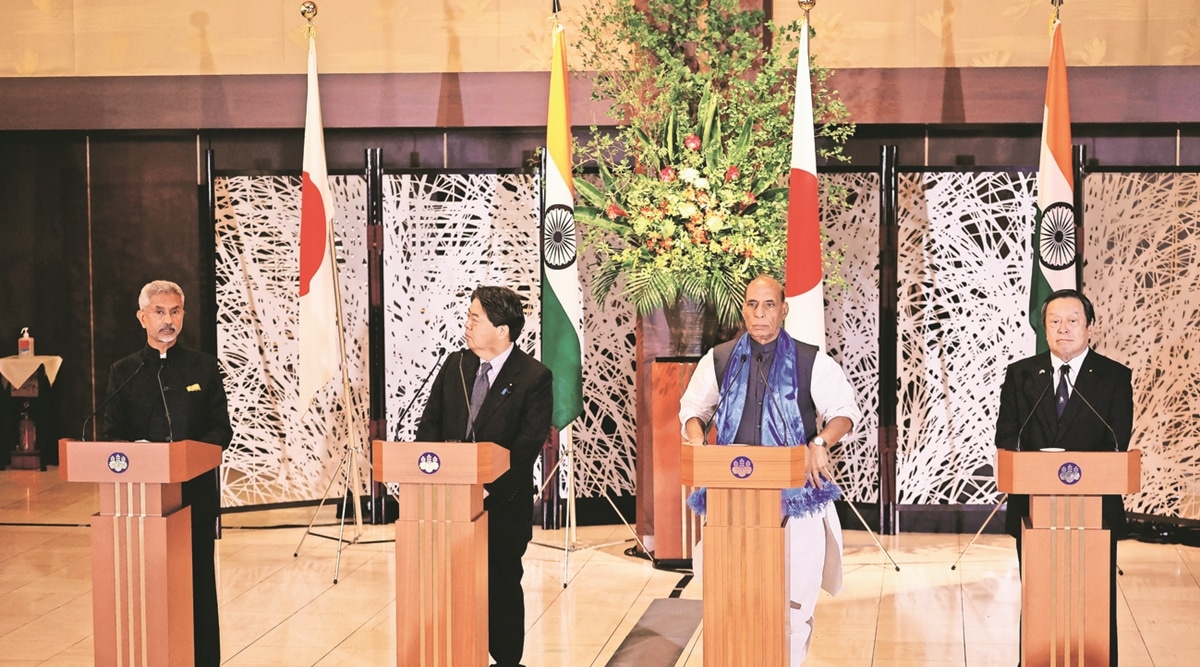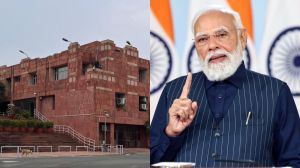With an eye on China, Japan’s foreign and defence ministers on Thursday told visiting External Affairs Minister S Jaishankar and Defence Minister Rajnath Singh that they are examining “all options” necessary for national defence including “counterstrike capabilities”, and will increase their defence budget substantially to strengthen their capabilities.

“While expressing its resolve to examine all options necessary for national defence, including so-called ‘counterstrike capabilities’, the Japanese side expressed its determination to fundamentally reinforce Japan’s defence capabilities within the next five years and secure substantial increase of Japan’s defence budget needed to effect it. Acknowledging Japan’s determination to reinforce its defence capabilities, Indian side expressed its support to work towards enhanced security and defence cooperation,” said the joint statement after the 2+2 ministerial meeting.
Without mentioning China’s belligerence in the region, the statement said: “Acknowledging that global cooperation is required more than ever to address security challenges that have become more acute, the ministers reaffirmed their commitment to a rules-based global order that respects sovereignty and territorial integrity of nations, and emphasised the need for all countries to seek peaceful resolution of disputes, in accordance with international law, without resorting to threat or use of force or any attempt to unilaterally change the status quo.”
“During today’s discussions, we noted the progress in the military-to-military cooperation and exchanges between the two sides. We shared a common desire to further increase the scope and complexities of our bilateral exercises. We have established staff talks and high-level dialogue between all the three services and the Coast Guard. I am glad that we have now agreed on staff talks between the joint staff of the Japanese Self Defence Forces and the Integrated Defence Staff of India,” said Singh.
“The participation of Japan for the first time in the multilateral exercise MILAN and operationalisation of the Reciprocal Provision of Supply and Services Agreement in March this year are milestones in the progress of defence cooperation between our forces. We are happy to note that our Air Forces are working closely for early conduct of the inaugural Air Force fighter exercise,” he said.
“Enhancing the defence equipment and technological cooperation between India and Japan is one of our key priority areas. In our meeting today, I had the opportunity to propose engagements in emerging and critical technological domains. I have also invited the Japanese defence companies to look at opportunities in investing in the Indian defence corridors,” he said.
Story continues below this ad
Jaishankar flagged the Covid-19 pandemic and the “ongoing conflicts” as “new challenges” and underscored the need to address them. “We have witnessed in recent times very serious developments, especially since our last meeting in 2019. The Covid pandemic and ongoing conflicts demand that we address these new challenges,” he said.
The 2+2 dialogue is taking place more than five months after Japanese Prime Minister Fumio Kishida visited India for the annual India-Japan summit.
The joint statement said the ministers highlighted their commitment to a “common strategic goal of achieving a free and open Indo-Pacific, that is inclusive and resilient, based on the rule of law, and free from coercion. The ministers also reiterated their strong support for ASEAN’s unity and centrality and their full support for the ‘ASEAN Outlook on the Indo-Pacific’ which upholds principles such as the rule of law, openness, freedom, transparency and inclusiveness.”
Underlining that the ministers had a “frank and fruitful” discussion on regional and global issues of mutual interests and concerns, particularly those in the Indo-Pacific as well as Ukraine, it said they also reaffirmed their commitments with respect to regional and global security challenges.
Story continues below this ad
“We held extensive discussions on ways to enhance maritime cooperation including maritime domain awareness. There is consensus on both sides that a strong India-Japan relationship is very important for a free, open, rule-based and inclusive Indo-Pacific based upon sovereignty and territorial integrity of nations. India’s Indo-Pacific Oceans Initiative shares many commonalities with Japan’s Free and Open Indo-Pacific. India has also developed maritime cooperation with regional partners in consonance with our inclusive vision of Security and Growth for All in the Region,” said Singh.
Jaishankar said that in the face of such challenges, the case for India and Japan to collaborate more closely on foreign policy and security has become even stronger. “Strengthening our foreign policy coordination is essential to realise the true benefits of the substantial convergence in our interests and outlook. They obviously concentrate on the Indo-Pacific but extend to many other regional, global and multilateral platforms as well. The exchange of views on the crucial situations facing the international community today was particularly useful. In parallel, there is an ongoing endeavor to deepen our defence exchanges and explore areas for practical cooperation,” he said.









